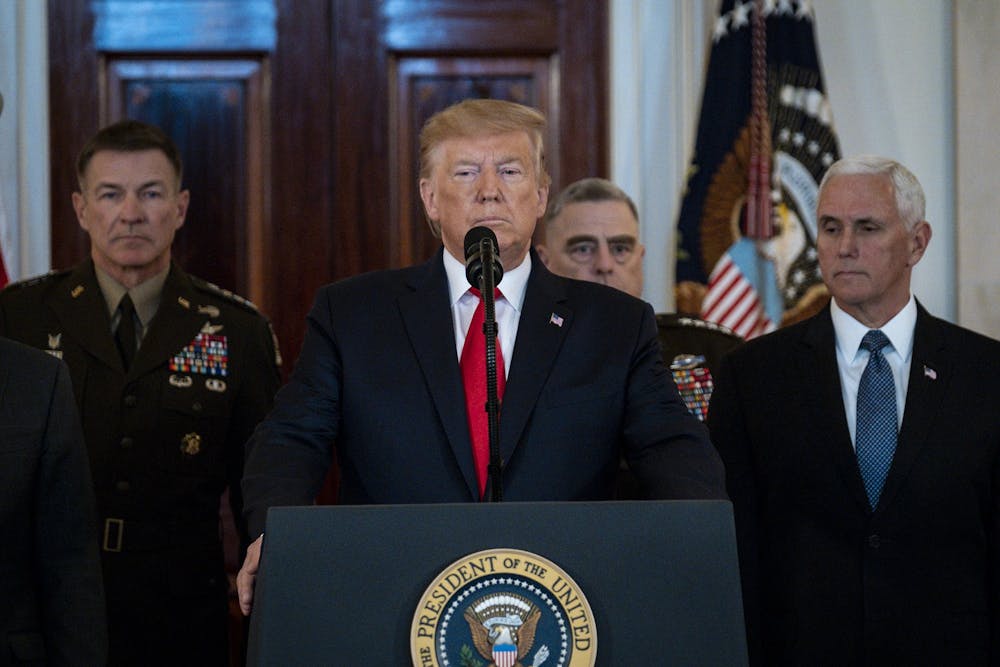So, how about World War III? In the past few weeks the United States killed a top Iranian military leader in a drone strike, and Iran retaliated days later by firing missiles at Iraqi bases housing U.S. soldiers. One missile accidentally struck a civilian airplane and killed 176 people.
The U.S. and Iran are moving toward war at a rate few expected. All measures should be taken to prevent unnecessary deaths.
I cannot stress this enough: Innocent people have already died. Stop reading for a minute and let that fully sink in. What if someone you loved was on the downed Ukrainian plane — how would you feel? The stakes in this situation are too high for anyone to be uninformed, especially President Donald Trump.
War affects everyone in society, not just those fighting it. In wartime, life changes dramatically. The death and destruction war would bring would be unlikely to leave many untouched.
When lives are on the line, we ought to listen to anything and anyone who might lessen the carnage. Lives are at stake in our effort to combat Iran, and those in the U.S. government should be looking at history to see how our situation got to where it is today.
With that, here’s a crash course in relevant information about what brought us to our current situation. The history of relations between the U.S. and Iran is one that has abounding twists, nuances and complexities.
Following Iran’s nationalization of its oil industry in 1953, which took what belonged to British Petroleum, the former name of BP Amoco PLC, the U.S. and the United Kingdom helped stage a coup that ousted the prime minister and restored the shah to power. This was the first action that caused U.S.-Iran relations to spoil.
While his policies were beneficial economically, the Shah stirred anti-U.S. sentiments. The 1979 Iranian revolution ended with the current theocratic regime seizing power. The U.S., after a group of Americans in Iran were held hostage for over a year starting in 1979, imposed economic sanctions on Iran. This caused the Iranian economy to decline and gave the ruling Iranian government someone to blame for the slowing economy and lowered their ability to import goods. The U.S. handed Iran a public relations campaign.
In 1983, amid the Iran-Iraq war, a truck bomb went off that killed 241 U.S. military personnel. In retaliation, Ronald Reagan declared Iran a state sponsor of terrorism, further reducing what Iran could get from the U.S. economically, despite continuing to sell Iran weapons in exchange for American hostages in the Middle East. Once more, the relations between the two countries grew ever more complicated.
Iran was discovered to be enriching uranium for their nuclear program in 2002, and international sanctions rained down. The 2015 Iran Nuclear Deal lifted some of the sanctions on Iran in exchange for downgrading production. The deal actually helped boost the Iranian economy, thereby slightly thawing tensions with the U.S.
On May 8, 2018, Trump said he was removing the U.S. from the agreement and reimposing economic sanctions. In retaliation, Iran threatened to abandon the nuclear restrictions and start producing more nuclear materials.
With just that, the slight thaw gave way to an even colder and more unstable relationship with Iran.
That leads us up until now. On Jan. 3, Trump ordered the killing of a top Iranian General, Qasem Soleimani. Trump has also said that he would attack historical and cultural sites, something that is banned by the Geneva Conventions and the Hague. These international agreements prevent war crimes and service a foundation of international law.
While political differences may change how you look at the president's actions, it should be clear that there is a lot of history, international law, military strategy and other complexities that need to be taken into account.
Although we do not know if the president consulted anyone, the president should strongly consider consulting Middle East historians and international law experts before he continues toward war. I would strongly encourage him to listen to them.
His actions thus far have proven exceptionally cavalier and lack any hint of restraint, and in a situation that could lead to war, restraint is the ultimate virtue. His rhetoric has proven that he says what he wants, even if it’s an outright threat of war crimes.
It may be premature to claim the U.S. is truly on the path toward war with Iran, but if we enter into further loss of life, we must do so only as our last resort. To do otherwise is to reduce the lives of soldiers to dispensable toys for war games and to further reduce the importance of those who have already died in this battle of wills.
Thomas Rainbolt (he/him) is a sophomore studying physics and astrophysics. When not doing anything else, he does research on weird physics particles called neutrinos.






